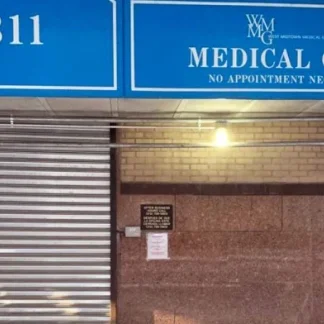Roberto Clemento Family Guidance Center
Roberto Clemento Family Guidance Center is a public rehab located in New York Ci...
West Midtown Medical Group, located in New York City, New York, offers alcohol and drug rehab services to men and women seeking recovery throughout the county. They offer an evidence-based and clinical approach to mental health care and addiction treatment.
West Midtown Medical Group focuses on providing integrated mental health and medical treatment. Their programs include outpatient treatment and medication-assisted treatment.
Outpatient Treatment The outpatient program offers individual, group, and family therapy. Additional services include medication-assisted treatment, medical care, social work support services, vocational and educational programming, 12-Step programs, domestic violence support, and relapse-prevention programming.
Medication-Assisted Treatment The medication-assisted treatment program combines mental health counseling with FDA-approved medications designed to mitigate withdrawal symptoms and help clients detox addictive substances from their body.
Private Insurance West Midtown Medical Group accepts most insurance plans, including Amerigroup, United Health Care, and Magellan. Out of network benefits can vary, so it’s important to contact your insurance carrier to discuss benefits.
Contact us for more information: (212) 736-5900

Connect with West Midtown Medical Group by calling their admissions team directly.
(212) 736-5900 Website Get DirectionsThe Joint Commission, formerly known as JCAHO, is a nonprofit organization that accredits rehab organizations and programs. Founded in 1951, the Joint Commision's mission is to improve the quality of patient care and demonstrating the quality of patient care.
Joint Commission Accreditation: Yes
Whether a marriage or other committed relationship, an intimate partnership is one of the most important aspects of a person's life. Drug and alcohol addiction affects both members of a couple in deep and meaningful ways, as does rehab and recovery. Couples therapy and other couples-focused treatment programs are significant parts of exploring triggers of addiction, as well as learning how to build healthy patterns to support ongoing sobriety.
Group therapy is any therapeutic work that happens in a group (not one-on-one). There are a number of different group therapy modalities, including support groups, experiential therapy, psycho-education, and more. Group therapy involves treatment as well as processing interaction between group members.
In individual therapy, a patient meets one-on-one with a trained psychologist or counselor. Therapy is a pivotal part of effective substance abuse treatment, as it often covers root causes of addiction, including challenges faced by the patient in their social, family, and work/school life.
Group therapy is any therapeutic work that happens in a group (not one-on-one). There are a number of different group therapy modalities, including support groups, experiential therapy, psycho-education, and more. Group therapy involves treatment as well as processing interaction between group members.
In individual therapy, a patient meets one-on-one with a trained psychologist or counselor. Therapy is a pivotal part of effective substance abuse treatment, as it often covers root causes of addiction, including challenges faced by the patient in their social, family, and work/school life.
In individual therapy, a patient meets one-on-one with a trained psychologist or counselor. Therapy is a pivotal part of effective substance abuse treatment, as it often covers root causes of addiction, including challenges faced by the patient in their social, family, and work/school life.
Roberto Clemento Family Guidance Center is a public rehab located in New York Ci...
Khaleidoscope Healthcare is a private rehab located in Jersey City, New Jersey. ...
Areba Casriel Institute is a drug and alcohol rehab located in New York, NY. The...
Visiting Nurse Service of New York is a private rehab located in Bronx, New York...